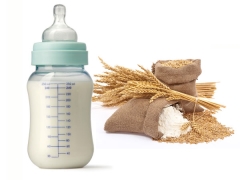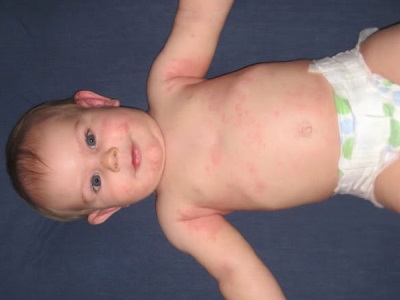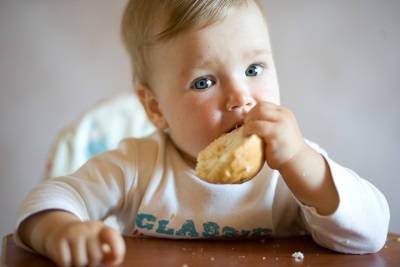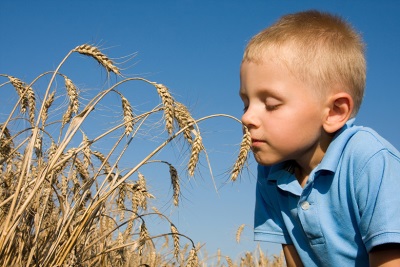For whom is gluten dangerous in baby food?
Having seen the word “gluten” on the food package for a child, many parents ask themselves the questions “what kind of substance is it?” And “Is it harmful to the baby?”. Let's figure it out.
What is it and why is it harmful?
Gluten called proteins, which are contained in cereals. The second name for these proteins is “gluten”. The main sources of gluten are wheat, barley and rye. Slightly less gluten is found in oats and corn.
Since cases of intolerance to this compound are not uncommon, its content is also monitored on the packaging of products that may contain gluten, responsible manufacturers write about this fact.
Chemical composition
In its structure, gluten is a high molecular weight complex protein. In its dried form, it contains oxygen, carbon, nitrogen, and hydrogen. This protein is formed from 18 amino acids, among which are valuable for humans, which are not synthesized in our body.
How it affects the body
Gluten does not cause any harm to healthy children and adults, but babies younger than a year may experience an allergic reaction to such proteins, therefore the introduction of grains, which are a source of gluten, into the diet is recommended not earlier than 6-8 months and with great care.
If there is intolerance to this protein (it occurs in 0.3-1% of people), then intestinal damage occurs. Due to the development of enteropathy, the absorption of nutrients from the intestine is disturbed, which causes a delay in development and growth.
Is there any benefit?
The use of gluten is the content in this compound important for the life of amino acids. For example, lysine in its composition is responsible for the growth of tissues and their regeneration. This amino acid is important for the immune system.
Gluten-free threonine supports the digestive system and the growth of the body. Thanks to the amino acid methionine, hemoglobin synthesis occurs. In addition, gluten contains phosphorus, calcium and vitamins (groups B, A and E).
Intolerance
A disease based on gluten intolerance and, accordingly, the products in which it is contained, is called "celiac disease". The main cause of the occurrence of such a disease is a genetic predisposition.
The disease affects the intestines and can develop in both children and adults. With such a pathology, a strict diet is shown, providing for the complete exclusion of wheat, rye and barley from the diet. This diet is called gluten-free.
Allergy symptoms
An allergic reaction to gluten can manifest itself:
- Abundant and frequent stools that have a strong odor. The feces in this case will be frothy, and its shade will be light or grayish.
- Bloating.
- Decreased appetite.
- Pale skin.
- Weight loss or stopping in weight gain.
- Nervousness, worsening of sleep, increased irritability or apathy.
To identify such an allergy, it is necessary to conduct studies of feces, blood composition and others. To eliminate such manifestations, it is prescribed to completely eliminate gluten from the diet. Also prescribed enzyme preparations, vitamins, probiotics, massage, gymnastics.
Opinion E. Komarovsky
The well-known doctor said that the mention of the gluten content on the boxes and jars of baby food is important first of all for mothers of children, who have to completely eliminate this substance from the diet. If the crumb does not suffer from celiac disease, then the presence of gluten in the product should not bother the parents.
What foods have gluten?
Gluten is found in all products whose components are wheat and other cereals containing the substance. First of all, these are cereals from wheat, rye and barley - semolina, wheat, barley, and barley.
Gluten is also detected in infant formula, canned food, ketchup, convenience foods, bakery products, dairy products, sausages, ice cream and many other products.
This substance is added to reduce the cost of production of such categories of products. In small amounts, gluten can be found in drug coatings.
Gluten Free Products
Children with intolerance to such a protein have to strictly control the diet and monitor the composition of the consumed foods, avoiding gluten in any form.
Mixes
Gluten-free blends are recommended for all children under 6 months. The absence of gluten in this diet can be judged by the presence on the packaging of the icon in the form of a crossed cone.
Products
Complementary baby food with gluten intolerance includes cereals made from corn, buckwheat, as well as rice. Also harm will not bring such grains as millet, quinoa, amaranth, sorghum. Such children are allowed dishes of potatoes and sweet potatoes, legumes, meat, eggs, dairy products, vegetable oils, fruits, fish, butter, vegetables.












